Policy uncertainty, risk-return considerations behind cash caution, Intellidex finds.

Significant growth in the nominal cash levels of the largest non-financial JSE-listed firms over the last 10 years does not point to a corporate investment strike, new research argues.
The findings come in the wake of reports that corporate South Africa is hoarding cash – a concept often tied to the idea of an “investment strike” – following a period of meaningful political and economic turbulence.
An independent study conducted by Intellidex on behalf of Business Leadership South Africa (BLSA) shows that although the total cash held by 85 mining and industrial companies listed on the JSE has increased by 17.4% per year to R765 billion over the past decade, the fluctuation in cash as a percentage of total assets has been fairly narrow at between 6.4% and 10.2%. It reached 7.8% last year.
In dollar terms, the net growth in cash over the period was 3.6% per year.
Financial firms were excluded because their cash holdings are affected by other factors, including regulation and deposits.
The research argues that the increase in nominal cash levels can largely be explained by the growth in the market capitalisation of companies over the period, the depreciation of the rand from roughly R7.29 to R16 against the dollar and the impact of inflation.
According to the study, there has been a correlation between cash levels and real GDP growth. In the wake of the 2008 recession, cash levels started moving upwards.

Stuart Theobald, executive chairman at Intellidex and co-author of the research, says companies respond to poor economic conditions by increasing their cash holdings.
But this does not mean corporates are on an investment strike or hoarding cash.
“When things are very difficult, you want to be cautious with your cash, because you don’t know how long you are going to have to ride out difficult conditions.”
Moreover, dividends paid as a percentage of cash on balance sheets, have come down over the past two years.
Theobald says this supports the view that caution is applied.
“Instead of companies refusing to invest and just holding on to cash, they are actually refusing to give that cash over to shareholders as a cautionary move.”
In difficult economic conditions, one would expect companies to increase their cash holdings because it becomes more expensive to raise cash, Theobald says.
Of particular concern is the fact that the return on equity in a mining company is about 4% on average, lower than the return on bank deposits.
“That is a serious problem because there is no rational reason to invest in a mining company when your return is below what you get from a bank deposit and that is the state that we are in at the moment and have been for the last three, four years.”
Although the rate of capital expenditure growth has been declining, expansion and investment spending have remained fairly strong (see graph below).

Theobald says there is no reason to connect the level of cash holdings to the investments companies are making.
“The cash growth has nothing to do with investment decisions. The things that do affect investment decisions are companies’ expectations over the returns that they can earn from those investments. The fact of the matter is – particularly in the mining sector – the returns that both shareholders and companies themselves receive from investments are lower than the returns from simply holding cash.”
He says to improve investment, one has to change the expectation of the return on those investments. There is currently a significant problem around expectations – particularly in the mining sector – which is tied directly to the policy environment.
“In the current environment any rational assessment of investment decisions is going to say: don’t invest. This is not hoarding, this is not some attempt to punish any government or anything.”
Theobald says the issue has to be addressed in a rational way. He argues that appropriate policy can change the outlook for returns on investment in the mining sector. A changing return outlook will also have a positive impact on business confidence – and in turn – investment decision-making.
Bonang Mohale, CEO of BLSA, says it is clear that businesses continue to invest and hold cash reserves at appropriate levels.
“Like in any country, South African businesses are structuring their balance sheets responsibly in response to a weaker economy and a lack of policy initiative from government.”
Mark Lamberti, director of BLSA and CEO of Imperial (pictured below), says risk-adjusted returns are important. Unless returns are greater than the cost of capital, businesses have a problem.

The cost of capital in a benign environment will be lower than in a risky environment. When a minister is fired and the rand depreciates sharply, investment will be affected, Lamberti says.
A 0.5% depreciation in the rand has a roughly R40 million impact on Imperial. Due to the risk of significant currency moves, the company has to be more cautious than it would be otherwise, he adds.
Lamberti says the concept of risk-adjusted returns doesn’t seem to be clear in the minds of commentators. It is a natural consequence that when the risk goes up, companies require higher returns before investing.
Long-term investments also demand policy certainty, Srinivasan Venkata-Krishnan, CEO of AngloGold Ashanti and BLSA director, adds.
“You cannot be pro-growth and anti-business. These two just don’t gel together. You’ve got to have a narrative which complements growth with a pro-business attitude in an inclusive manner.”
Brought to you by Monyweb






